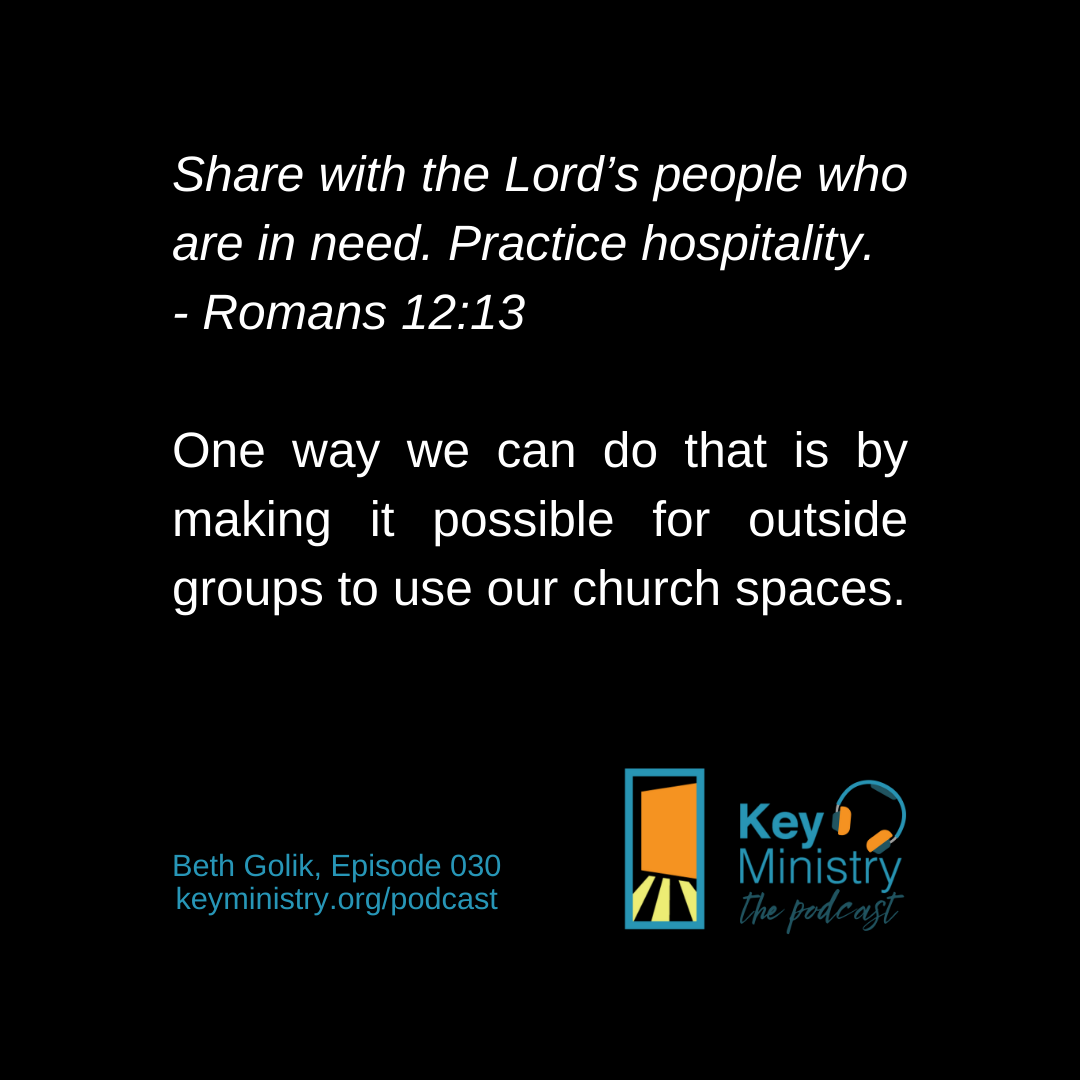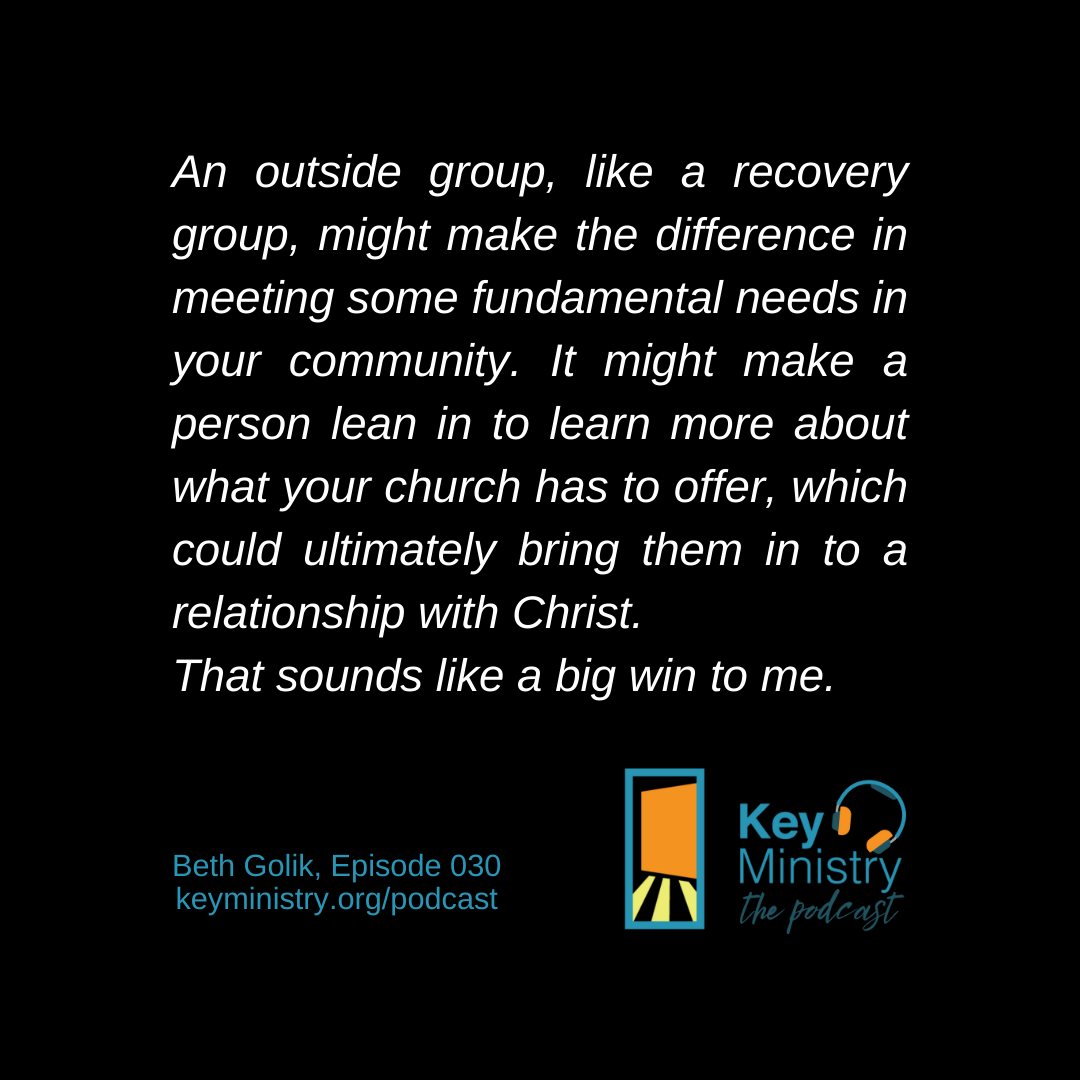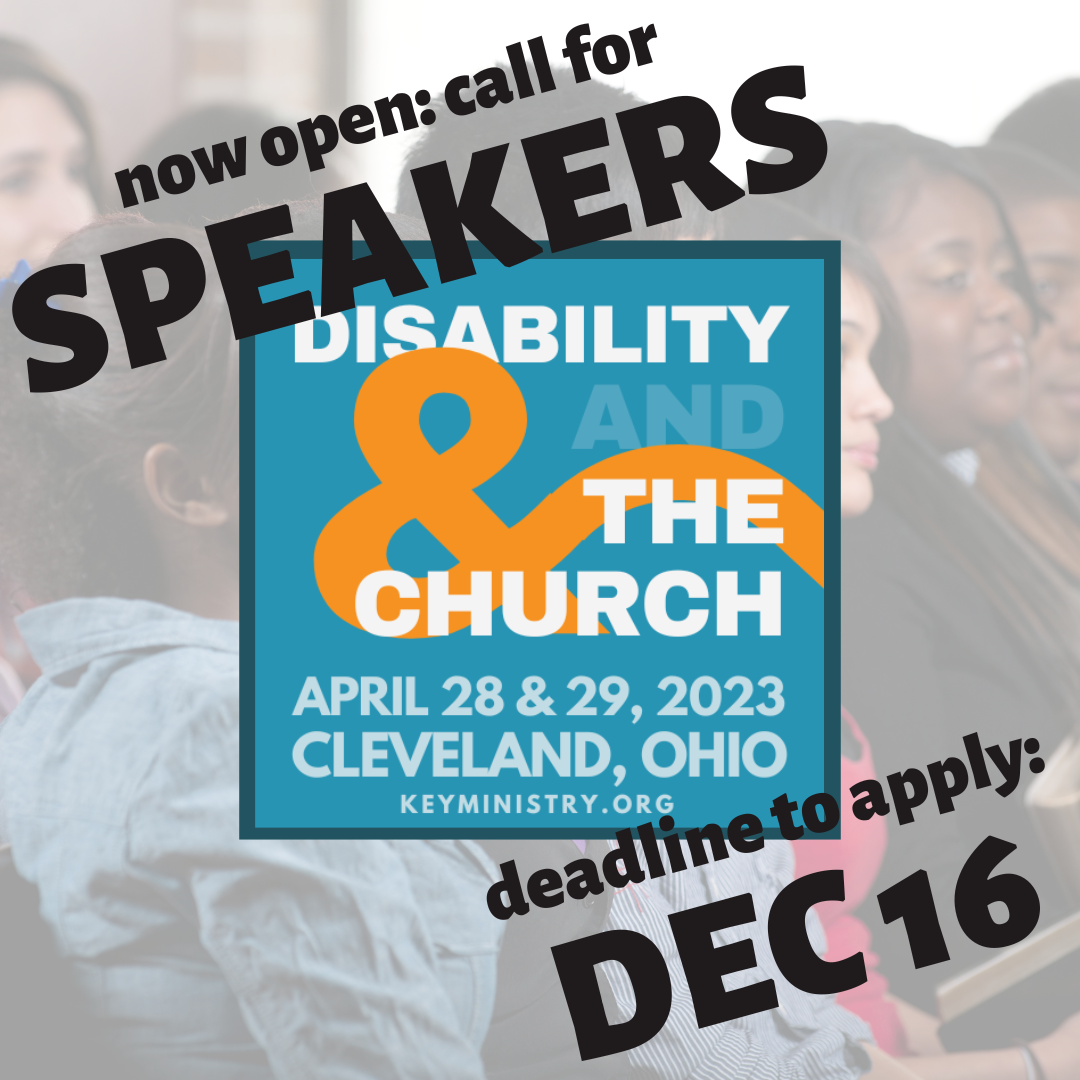In today’s episode, Beth Golik shares how practicing hospitality to outside groups has blessed her church and met fundamental needs in their community. Make sure to listen all the way to the end to hear how ministry leaders can apply to speak at DATC2023!
Listen now in your favorite podcast app!
Quick Links:
DATC2023 Speaker Application Form
Transcript:
This is Beth Golik, one of your cohosts for Key Ministry: The Podcast. I have a short episode for you today, and I invite you to listen all the way to the end because I have the scoop on an opportunity for any ministry leaders who are listening to this before our next episode launches on December 15.
But first, let’s dive into today’s episode.
I’m on staff at a large-ish suburban church. Not huge, but not tiny. We own our own building and are blessed with, in my opinion, some pretty amazing facilities. Now I know our podcast listeners represent a variety of church contexts. Some of your churches are very big and some have congregations of under two dozen people. You might be worshiping in a house church, or in a mobile church that is renting out space in a school or other type of building.
That being said, I want to share some insight I learned during a recent staff meeting at my church. Our facilities director shared a little bit about the outside groups that use our church building for meeting space throughout the week. With his permission, I want to give you a peek at the impact opening up our facilities has made in the lives of some folks in our community.
He began his presentation by reminding us that our church does have certain criteria that outside groups must meet in order to use space. But as long as the criteria are met, we welcome them. As he put it, “Any opportunity to share the Kingdom with the community is part of God’s plan…and should be part of ours.”
We both personally know of several people who are now attending worship services at our church after having first come into the building for a meeting or event.
We have several AA meetings in our building every week. AA, which stands for Alcoholics Anonymous, started in 1935 in Akron, Ohio. The first meeting consisted of two people. It is now present in about 180 countries worldwide and current membership is estimated at just over two million people. There are approximately 123,000 AA groups worldwide and its literature has been translated into more than 100 languages. It has no governing body, collects no dues, and no one profits.
People with other addictions have seen the success of AA and have adopted their methods of recovery. There are 17 recovery groups that meet at my church each and every week, including Gamblers Anonymous, Overeaters Anonymous, and sexual addiction recovery groups.
A member of one recovery group shared the following with our church staff:
“[We are] extremely grateful for the generosity of [your church] and the staff. Having a place to meet has changed many lives. This year is my tenth year of recovery and the tenth time I was at the Gratitude Meeting we have on Thanksgiving Day at your church. This year about 100 people were in attendance. I don’t know if that would have happened for me if it wasn’t for meeting the people and witnessing the miracles that I was blessed to see in that building. Hundreds if not thousands of people I know owe a debt of gratitude that we couldn’t possibly repay monetarily, but we can be better citizens of the community and be of service to our families, friends, and the struggling people we meet in these rooms. Interestingly enough, many people in recovery find a new path to God. I know I did. What better place to start than in the basement of a church. In short, I know hundreds of people that are alive today because they walked into [your church] and continue to come back.”
That letter that I just read to you is just one of the testimonies that outside groups have shared with our facilities director.
In addition to recovery groups, our church regularly hosts homeschool coops, artist workshops, a grief support group for kids, a mobile soup kitchen, retreats, civic groups, book clubs, early childhood PTA events, and even election day voting.
Romans 12:13 says, “Share with the Lord’s people who are in need. Practice hospitality.”
One way we can do that is by making it possible for outside groups to use our church spaces.
Yes, sometimes it’s frustrating as a staff member when a room you had hoped to use is not available because of a group meeting. Or maybe the furniture got rearranged a bit by the outside group and you need to spend a minute or two getting things back into place. Could be a tad inconvenient at times. But, here’s the deal.
An outside group, like a recovery group, might make a difference in meeting some fundamental needs in your community. It might make a person lean in to learn more about what your church has to offer, which could ultimately bring them into a relationship with Christ. That sounds like a big win to me.
Thank you for spending these few minutes with me today.
Before I sign off, I want to give you the scoop on our call for speakers for the upcoming Disability & The Church conference happening this spring.
You can visit our show notes for today’s episode for links to information on our national disability ministry conference happening in Cleveland, Ohio April 28 & 29, 2023. You’ll be hearing more about it on future podcasts, but today I want to give you the heads up that if you’d like to be considered as a speaker, the deadline to apply is midnight on Friday, December 16.
You have the opportunity to apply to present a QuickTake (which is like a TEDTalk style 15-minute presentation) or a Workshop that is up to 75 minutes in length. We encourage multi-presenter workshops, especially those representing different organizations. We are specifically interested in proposals that will advance the disability ministry movement through content that is innovative, creative, inspired, and non-programmatic. We’ve listed several topics that we’re interested in on the speaker application form. A few of them include: disability in ministry leadership; engaging lead pastors in the promotion and implementation of disability ministry; research on ministry needs and “best practices”; trauma; ministry initiatives to persons with disabilities associated with aging; and new and impactful family support models. If you are a ministry leader with a message that you’d like to share on a national platform, please consider this your invitation to apply. Applications are due Friday, December 16. Visit keyministry.org today.







